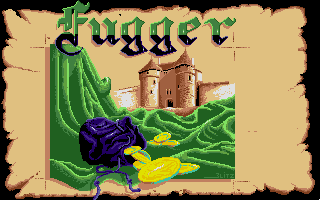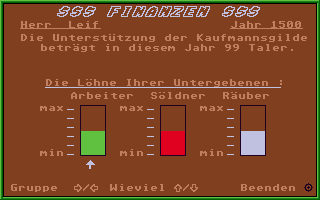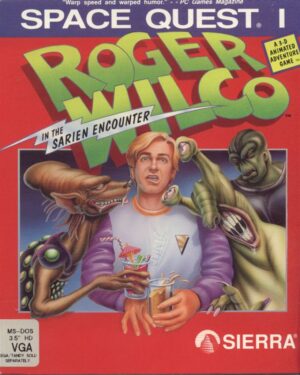Retro Replay Review
Gameplay
Fugger offers a deep and engaging economic simulation that challenges players to build a mercantile empire in 16th-century Germany. You begin with a modest inheritance—20 barrels of beer and 500 Talers—and must leverage these assets to amass wealth through shrewd trading. The core loop revolves around buying low and selling high across six distinct commodities, all while navigating the fluctuating markets of 11 different cities.
(HEY YOU!! We hope you enjoy! We try not to run ads. So basically, this is a very expensive hobby running this site. Please consider joining us for updates, forums, and more. Network w/ us to make some cash or friends while retro gaming, and you can win some free retro games for posting. Okay, carry on 👍)
What sets Fugger apart is its competitive multiplayer design: up to six players can take turns on a single machine. This hot-seat format introduces layers of psychological warfare, as you can choose to bribe rivals, form temporary alliances, or even sabotage opponents’ trade caravans. Each decision carries risk, creating tense standoffs and negotiated truces that feel every bit as important as your balance sheet.
The game’s mechanics strike a fine balance between accessibility and depth. Supply and demand are clearly displayed, but unexpected events—like crop failures or city tax hikes—can quickly upend your plans. To stay ahead, you’ll need to keep a close eye on market trends, invest in faster transport, and occasionally resort to underhanded tactics to disrupt your opponents’ supply lines.
As you progress, you can unlock additional trade routes and special actions, such as hiring mercenaries to raid competitors or employing city officials to manipulate tariffs. This evolving toolkit ensures that no two sessions of Fugger feel the same, fostering a high degree of replayability and strategic variety.
Graphics
Fugger embraces a classic sprite-based aesthetic, reminiscent of early ’90s strategy titles. The city maps and merchant caravans are rendered in clean, functional detail, focusing on clarity rather than flashy visual effects. While it may not compete with modern 3D graphics, its interface is intuitive and serviceable for tracking multiple resources at once.
Each of the 11 cities has a distinctive icon and color scheme, making it easy to identify trading hubs at a glance. The commodity icons—ranging from beer kegs to luxury textiles—are well designed, ensuring you always know what’s in your inventory or market stalls. Animation is modest but effective: you’ll see wagons moving along trade routes and simple indicators for supply surges or shortages.
The UI panels are neatly organized, with supply/demand curves, your cash reserves, and available special actions all visible on one screen. Though the typography and window frames evoke an older era of PC gaming, they remain clear and readable. Tooltip pop-ups provide contextual information, so newcomers can learn the ropes without constant reference to an external manual.
Sound design is minimal, consisting mainly of era-appropriate jingles and click effects for menu navigation. While not especially immersive, the audio cues serve their purpose in signaling turn transitions or market fluctuations, allowing you to focus on the strategic aspects of the game.
Story
Fugger’s narrative framework is simple but effective: you are an impoverished nobody in Germany, year 1500, unexpectedly thrust into the world of high finance after inheriting your uncle’s modest estate. From this humble starting point, you’re driven by the ambition to become one of the most respected and wealthy members of society. This underdog premise gives every transaction a sense of purpose.
Rather than a linear storyline, Fugger provides emergent narratives shaped by player actions. Will you be remembered as a philanthropic trader who stabilizes markets, or as a ruthless baron who exploits famines for profit? The game’s open structure allows you to craft your own legend through alliances, betrayals, and high-stakes negotiations.
Historical flavor permeates the setting: city names, era-appropriate goods, and occasional random events—such as epidemics or royal decrees—immerse you in the turbulent world of early modern Europe. While there are no voiced characters or cutscenes, brief text vignettes at key moments (like inheriting your uncle’s brewery) provide enough context to keep you invested in your rise to prominence.
The multiplayer aspect also generates its own stories. Long-standing rivalries form as players jockey for dominant positions, leading to memorable moments of betrayal when a trusted ally suddenly undercuts you in a lucrative trade. These interpersonal dynamics become the true heart of Fugger’s narrative experience.
Overall Experience
Fugger delivers a compelling blend of economic depth and player interaction that will appeal to fans of classic simulations like Kaiser and Hanse. Its combination of market speculation, resource management, and clandestine tactics creates a rich strategic tapestry that rewards both careful planning and bold gambits.
The learning curve is moderate: newcomers can grasp the basics within a few turns, but mastering the interplay of supply shocks, forged alliances, and covert attacks takes time. Fortunately, Fugger’s hot-seat multiplayer mode turns each playthrough into a lively social affair, perfect for gaming sessions with friends or family.
Replay value is high thanks to variable city markets, randomized events, and the unpredictable choices of human opponents. No two games will unfold the same way, ensuring that you’ll keep coming back to test new strategies or settle old scores. Single-player skirmishes against AI can also be customized for difficulty, providing a solid practice ground before challenging real rivals.
While Fugger’s visuals and audio may feel dated compared to modern releases, its robust economic engine and emphasis on interpersonal competition make it a standout title in the genre. For anyone interested in historical trade simulations or competitive multiplayer board-style games, Fugger offers hours of engrossing, high-stakes fun.
 Retro Replay Retro Replay gaming reviews, news, emulation, geek stuff and more!
Retro Replay Retro Replay gaming reviews, news, emulation, geek stuff and more!









Reviews
There are no reviews yet.